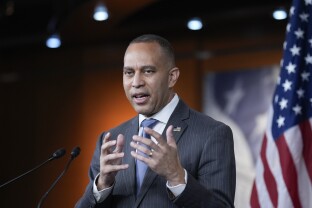California is less than two weeks away from voters deciding whether to approve new congressional district lines. Democrats across the country are jumping in to help push the ballot initiative through, knowing it will be a decisive data point in their broader redistricting efforts.
State by state, Republicans have delivered seats that are more friendly to their party as President Donald Trump looks for ways to preserve and grow the House majority ahead of next year’s midterms. But the Proposition 50 ballot initiative in California is Democrats’ first opportunity to gain up to five seats tilted toward their party.
“We’re on the verge of winning Prop 50, which is an important and decisive response, and there are ongoing efforts across the country, including in Illinois, to decide what is the next step to push back against the aggressive gerrymandering as part of Donald Trump’s effort to rig the midterm elections,” House Minority Leader Hakeem Jeffries told NOTUS when asked about ongoing conversations regarding redistricting.
“Our efforts across the country will be ongoing and continuous.”
Sign Up for NOTUS’ Free Daily Newsletter
In California, Democrats are aware of how much what they do could serve as a blueprint or momentum for other states. Blue states like Virginia, Illinois, Maryland and New York have signaled interest in pursuing this path, but Democrats in each state face various hurdles and timelines to do so.
“If you’re a Democratic leader in a red state, you’re cheering the action of California Democrats who are fighting the fight on your behalf, and if you’re a Democratic leader in a blue state where you have the legislature and/or the governor’s office, you see close monitoring of what’s going on here to get into the fight yourselves,” Rusty Hicks, chair of the California Democratic Party, told NOTUS.
“So Illinois, Maryland, and New York, wherever you can squeeze out a seat or two, because North Carolina and Indiana and these other states are looking to do the same,” he continued.
California is the first state in which Democrats have begun redistricting in response to Republican efforts to redistrict their states under pressure from Trump. If Proposition 50 passes, the new maps would be used until 2030, at which point the state’s independent redistricting commission would again draw new ones based on the census.
However, due to recent state-level reforms in blue states aimed at stopping political gerrymandering, Democrats have fewer options when it comes to redistricting, limiting their options to respond to Republican efforts. Even California is legally required by state law to obtain voter approval for redistricting measures — unlike other states, like Texas, where the process lies almost exclusively with the state Legislature.
Illinois and Virginia are two of the Democratic states currently considering redistricting efforts.
“I want Prop 50, and in my opinion, we have to do what we have to do in my state, too,” Rep. Robin Kelly of Illinois told NOTUS. “They’re just getting into it more now, but hopefully Prop 50 will pass and that will be the role model.”
Earlier in October, Jeffries campaigned for Proposition 50 with Rep. Sydney Kamlager-Dove in Southern California. Former President Barack Obama held a virtual campaign rally with Gov. Gavin Newsom on Wednesday, where he continued to make the case that the outcome of the statewide initiative has national implications. The “Yes on 50” campaign has also greatly outraised the “No on Prop 50” campaign, raking in almost $97 million, compared to $42 million the No on Prop 50 campaign brought in, according to CalMatters.
National Democratic figures are also putting in virtual appearances. The “Yes on 50” campaign has steadily released ads featuring lawmakers from outside of California, including Reps. Alexandria Ocasio-Cortez and Jasmine Crockett and Sens. Chris Murphy and Elizabeth Warren.
“When Donald Trump ordered Texas Republicans to rig the next election, they drew my seat off the map,” Crockett, who is now mulling a Senate run, says in one ad. “California, our right to fair representation is in your hands. With Prop 50, you have the power to stop them,” she continues.
For the “Yes on 50” campaign, that type of involvement is welcome.
“Those messengers are an important proof point for that and to sort of send that message home about what California can do and what’s at stake in California, but what’s at stake nationally,” a spokesperson for the “Yes on 50” campaign said. “This is what Californians can do, broadly.”
Warren told NOTUS that she was glad to help “get the word out” about Proposition 50.
“When the Republicans in Texas decided to change the rules and redistrict in the middle of an election cycle, they affect the whole country. So California said they would put it to their voters and see if the voters wanted to do the same thing in California, and I support that,” Warren told NOTUS.
Mail-in voting has already begun in California, with more than 3.4 million ballots already turned in. Voters can also cast their ballots at the polls on Nov. 4.
—
This story was produced as part of a partnership between NOTUS and NewsWell, home of Times of San Diego and Stocktonia.
Sign in
Log into your free account with your email. Don’t have one?
Check your email for a one-time code.
We sent a 4-digit code to . Enter the pin to confirm your account.
New code will be available in 1:00
Let’s try this again.
We encountered an error with the passcode sent to . Please reenter your email.


